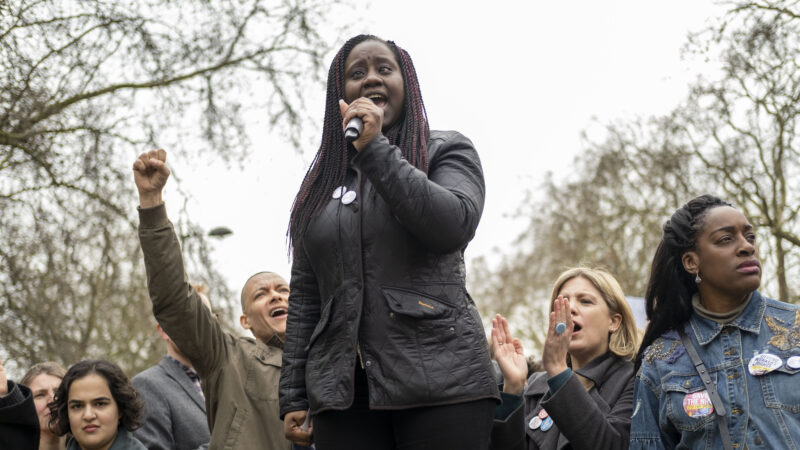
Campaigning with a disability is rarely less than a challenge – and a winter election makes it even more so. That doesn’t mean it isn’t worth it, and across the country disabled Labour Party members are getting stuck in this election. The reason is simple: perhaps more than any other group, we understand what is at stake. Disabled people have been amongst the greatest victims of austerity, and our manifesto now is the best any party has ever delivered in terms of our many and varied needs.
In this election, Labour has at least five candidates with declared and significant disabilities – almost certainly the most it has ever fielded. “Disabled people are resourceful, and we just make it work,” says Emily Pomroy-Smith, Labour’s prospective parliamentary candidate for South West Wiltshire. An ambulatory wheelchair user whose condition, Ehlers-Danlos Syndrome, means she can walk but sometimes needs sticks or a chair, Emily faces poor public transport and inaccessible pavements.
On at least one occasion, a constituent has initially refused to believe someone as visibly disabled might be the candidate. But she and supporters believe they are gaining traction in traditionally a safe Tory rural seat – and that following a strong performance at a hustings this week, local Conservative incumbent Andrew Murrison “will not be underestimating me again”.
In 2017, two candidates with disabilities – Marsha de Cordova in Battersea and Jared O’Mara in Sheffield Hallam – scored unexpected victories. The latter has since stepped down, but de Cordova – who is partially sighted – is now a popular local MP and shadow minister for disabled people. Which, of course, helps explain why this year’s manifesto has done so well in reflecting the concerns and aspirations of disabled people.
‘It’s Time for Real Change‘ and the disability-specific ‘Breaking Down Barriers‘ both promise a raft of achievable, specific policies that will benefit those with particular disabilities and conditions. That includes greater recognition for those with neurodivergent conditions such as autism and recognising British Sign Language legally as a language. But even more importantly, it will end the ‘hostile environment’ of Universal Credit, Work Capability Assessments and cuts, instead building a more inclusive society. Disabled people will be amongst the greatest beneficiaries of improved public transport access, better social housing and lifelong education.
“It’s really important that disabled people are part of the new opportunities created by the Green New Deal,” says Lucy Burke, PPC for Bury South and probably most likely to become the party’s next disabled MP. An academic specialising in disability issues with several hidden conditions including osteoarthritis, she says this election campaign is the physically hardest thing she has ever done. “But it’s worth it. I feel desperately driven to reverse the terrible hardships this government has inflicted, particularly on disabled people.”
In Thanet, former General Practitioner and PPC Dr Coral Jones is also buzzing after a successful hustings. As a deaf candidate who uses two hearing aids, she says people often forget her impairment, or simply do not notice it campaigning on the doorsteps. But she believes it is usually important that people see visibly disabled candidates, and that their experiences are part of the political process. “Otherwise, disabled people just get sidelined,” she tells me. “It has been fantastic having Marsha in parliament, showing what someone with a visual impairment can really do.”
According to the Joseph Rowntree Foundation, half of all families living in the deepest poverty contain one or more disabled members – an indicator of how poorly handled conditions and impairments are fuelling Britain’s wider social crisis. Getting those lived experiences into politics is crucial to tackling them, which is one reason disabled people find it so empowering to see others like them represented. Labour has committed to reopening the Access to Elected Office Fund to support disabled candidates – the absence of which often leaves them or the party bearing the additional costs of adjustments.
“I’m getting a great deal out of the experience,” says Kerena Marchant, a profoundly deaf PPC standing against former Conservative minister Maria Miller in Basingstoke. But she says the lack of funding for sign language interpreters is a problem – and while the Labour Party has offered her bursary, she does not know how much it will be. “The snap election is also an impediment as interpreters are booked up,” she says.
For many local parties and able-bodied members, having disabled candidates and activists is a learning experience in its own right, which is why we keep turning up despite the challenges. This election might be wet and cold, but it feels like we’re finally getting our voices much more heard.
“As an able-bodied person, working with disabled people has opened my eyes to seeing it from their perspective,” says Emma Hoddinott, a Labour councillor and Co-op Party local government officer who has been working on a review for the Co-op Party to support disabled local and national candidates. “There’s a tendency to just assume people with disabilities can do phone banking, but we should be looking at enabling candidates to do what they want to do.”




More from LabourList
Nudification apps facilitate digital sexual assault – and they should be banned
Diane Abbott suspended from Labour after defending racism comments
Labour campaign groups join forces to call for reinstatement of MPs